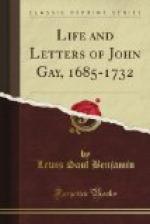ALEXANDER POPE TO JOHN GAY.
October 2nd, 1732.
“Every man, and every boy, is writing verses on the royal hermitage: I hear the Queen is at a loss which to prefer; but for my own part I like none so well as Mr. Poyntz’s[6] in Latin. You would oblige my Lady Suffolk if you tried your muse on this occasion. I am sure I would do as much for the Duchess of Queensberry, if she desired it. Several of your friends assure me it is expected from you. One should not bear in mind all one’s life, any little indignity one receives from a Court, and therefore I am in hopes, neither her Grace of Queensberry will hinder you, nor you decline it.”
* * * * *
The “royal hermitage” was a building erected by Queen Caroline in the grounds of Richmond Palace, and decorated with busts of her favourite philosophers. This letter of Pope seems extraordinary, and it is a little difficult to guess what inspired the suggestion contained in it. “This is but shabby advice,” Croker has written, “considering the general tone of Pope’s private correspondence, as well as his published satires, and seems peculiarly strange in the circumstances in which Gay himself and the Duke and Duchess of Queensberry, on his account, stood with the Queen. If it were not for the introduction of Lady Suffolk’s name, I should have thought Pope’s advice sheer irony, and a hint for a libel on the Court. The Duchess and Gay were offended at the proposition.” It may be, however, that Pope thought it possible that such a poetical effusion as he had in mind might restore Gay to favour at Court. Gay, who received Pope’s letter while he was on a visit to Orchard Wyndham, the seat of Sir William Wyndham, in Somersetshire, would do nothing in the matter, as will be seen from his reply.
JOHN GAY TO ALEXANDER POPE.
October 7th, 1732.
“I am at last returned from my Somersetshire expedition, but since my return I cannot boast of my health as before I went, for I am frequently out of order with my colical complaint, so as to make me uneasy and dispirited, though not to any violent degree. The reception we met with, and the little excursions we made, were in every way agreeable. I think the country abounds with beautiful prospects. Sir William Wyndham is at present amusing himself with some real improvements, and a great many visionary castles. We are often entertained with sea-views, and sea fish, and were at some places in the neighbourhood, among which I was mightily pleased with Dunster Castle, near Minehead. It stands upon a great eminence, and has a prospect of that town, with an extensive view of the Bristol Channel, in which are seen two small islands, called the Steep Holms and Flat Holms, and on the other side we could plainly distinguish the divisions of fields on the Welsh coast. All this journey I performed on horseback, and I am very much disappointed that at present I feel myself so little the better for it. I have indeed followed riding and exercise for three months successively, and really think I was as well without it: so that I begin to fear the illness I have so long complained of, is inherent in my constitution, and that I have nothing for it but patience.




